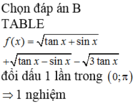Giải phương trình sau: tanx + tan (x+π/4) = 1
Hãy nhập câu hỏi của bạn vào đây, nếu là tài khoản VIP, bạn sẽ được ưu tiên trả lời.


Lê Huy Hoàng:
a) ĐK: $x\in\mathbb{R}\setminus \left\{k\pi\right\}$ với $k$ nguyên
PT $\Leftrightarrow \tan ^2x-4\tan x+5=0$
$\Leftrightarrow (\tan x-2)^2+1=0$
$\Leftrightarrow (\tan x-2)^2=-1< 0$ (vô lý)
Do đó pt vô nghiệm.
c)
ĐK:.............
PT $\Leftrightarrow 1+\frac{\sin ^2x}{\cos ^2x}-1+\tan x-\sqrt{3}(\tan x+1)=0$
$\Leftrightarrow \tan ^2x+\tan x-\sqrt{3}(\tan x+1)=0$
$\Leftrightarrow \tan ^2x+(1-\sqrt{3})\tan x-\sqrt{3}=0$
$\Rightarrow \tan x=\sqrt{3}$ hoặc $\tan x=-1$
$\Rightarrow x=\pi (k-\frac{1}{4})$ hoặc $x=\pi (k+\frac{1}{3})$ với $k$ nguyên
d)
ĐK:.......
PT $\Leftrightarrow \tan x-\frac{2}{\tan x}+1=0$
$\Leftrightarrow \tan ^2x+\tan x-2=0$
$\Leftrightarrow (\tan x-1)(\tan x+2)=0$
$\Rightarrow \tan x=1$ hoặc $\tan x=-2$
$\Rightarrow x=k\pi +\frac{\pi}{4}$ hoặc $x=k\pi +\tan ^{-2}(-2)$ với $k$ nguyên.

\(\Leftrightarrow2x=x-\dfrac{\pi}{4}+k\pi\)
\(\Leftrightarrow x=-\dfrac{\pi}{4}+k\pi\) (\(k\in Z\))
Em nghĩ là sai. ĐKXĐ là x ≠ \(\dfrac{\pi}{4}\) + k . \(\dfrac{\pi}{2}\)
Phương trình vô nghiệm

a, cos2x - sin7x = 0
⇔ cos2x = sin7x
⇔ cos2x = cos \(\left(7x-\dfrac{\pi}{2}\right)\)
⇔ \(\left[{}\begin{matrix}7x-\dfrac{\pi}{2}=2x+k2\pi\\7x-\dfrac{\pi}{2}=-2x+k2\pi\end{matrix}\right.\) với k là số nguyên
⇔ \(\left[{}\begin{matrix}x=\dfrac{\pi}{10}+\dfrac{k.2\pi}{5}\\x=\dfrac{\pi}{18}+\dfrac{k2\pi}{9}\end{matrix}\right.\) với k là số nguyên

a, Điều kiện xác định: \(x \ne 90^\circ + k180^\circ \).
Ta có:\({\rm{ }}tanx = tan55^\circ \Leftrightarrow x = 55^\circ + k180^\circ ,{\rm{ }}k\; \in \;\mathbb{Z}\,\,(TM).\)
b, Điều kiện xác định: \(2x + \frac{\pi }{4} \ne \frac{\pi }{2} + k\pi \Leftrightarrow x \ne \frac{\pi }{8} + k\pi ,k \in \mathbb{Z}.\)
Ta có: \(\tan \left( {2x + \frac{\pi }{4}} \right) = 0 \Leftrightarrow 2x + \frac{\pi }{4} = k\pi \Leftrightarrow x = -\frac{\pi }{8} + k\frac{\pi }{2},k \in \mathbb{Z}\,\,(TM).\)

a.
\(\left(sin^2\dfrac{x}{2}+cos^2\dfrac{x}{2}\right)^2-2sin^2\dfrac{x}{2}cos^2\dfrac{x}{2}=\dfrac{1}{2}\)
\(\Leftrightarrow2-\left(2sin\dfrac{x}{2}cos\dfrac{x}{2}\right)^2=1\)
\(\Leftrightarrow1-sin^2x=0\)
\(\Leftrightarrow cos^2x=0\)
\(\Leftrightarrow x=\dfrac{\pi}{2}+k\pi\)
b.
\(\left(sin^2x+cos^2x\right)^3-3sin^2x.cos^2x\left(sin^2x+cos^2x\right)=\dfrac{7}{16}\)
\(\Leftrightarrow1-\dfrac{3}{4}\left(2sinx.cosx\right)^2=\dfrac{7}{16}\)
\(\Leftrightarrow16-12.sin^22x=7\)
\(\Leftrightarrow3-4sin^22x=0\)
\(\Leftrightarrow3-2\left(1-cos4x\right)=0\)
\(\Leftrightarrow cos4x=-\dfrac{1}{2}\)
\(\Leftrightarrow4x=\pm\dfrac{2\pi}{3}+k2\pi\)
\(\Leftrightarrow x=\pm\dfrac{\pi}{6}+\dfrac{k\pi}{2}\)

ĐK: \(x\ne-\dfrac{\pi}{4}+k\pi\)
\(\dfrac{tanx}{1-tan^2x}=\dfrac{1}{2}cot\left(x+\dfrac{\pi}{4}\right)\)
\(\Leftrightarrow\dfrac{2tanx}{1-tan^2x}=tan\left(\dfrac{\pi}{4}-x\right)\)
\(\Leftrightarrow tan2x=tan\left(\dfrac{\pi}{4}-x\right)\)
\(\Leftrightarrow2x=\dfrac{\pi}{4}-x+k\pi\)
\(\Leftrightarrow x=\dfrac{\pi}{12}+\dfrac{k\pi}{3}\)

Đáp án B
TABLE f ( x ) = tan x + sin x + tan x − sin x − 3 tan x đổi dấu 1 lần trong 0 ; π ⇒ 1 nghiệm



Điều kiện:
⇔ tan x.(1 - tanx) + tanx + 1 = 1 – tan x.
⇔ tan x - tan2x + 2.tan x = 0
⇔ tan2x - 3tanx = 0
⇔ tanx(tanx - 3) = 0
Vậy phương trình đã cho có tập nghiệm là:
{arctan 3+kπ; k ∈ Z }